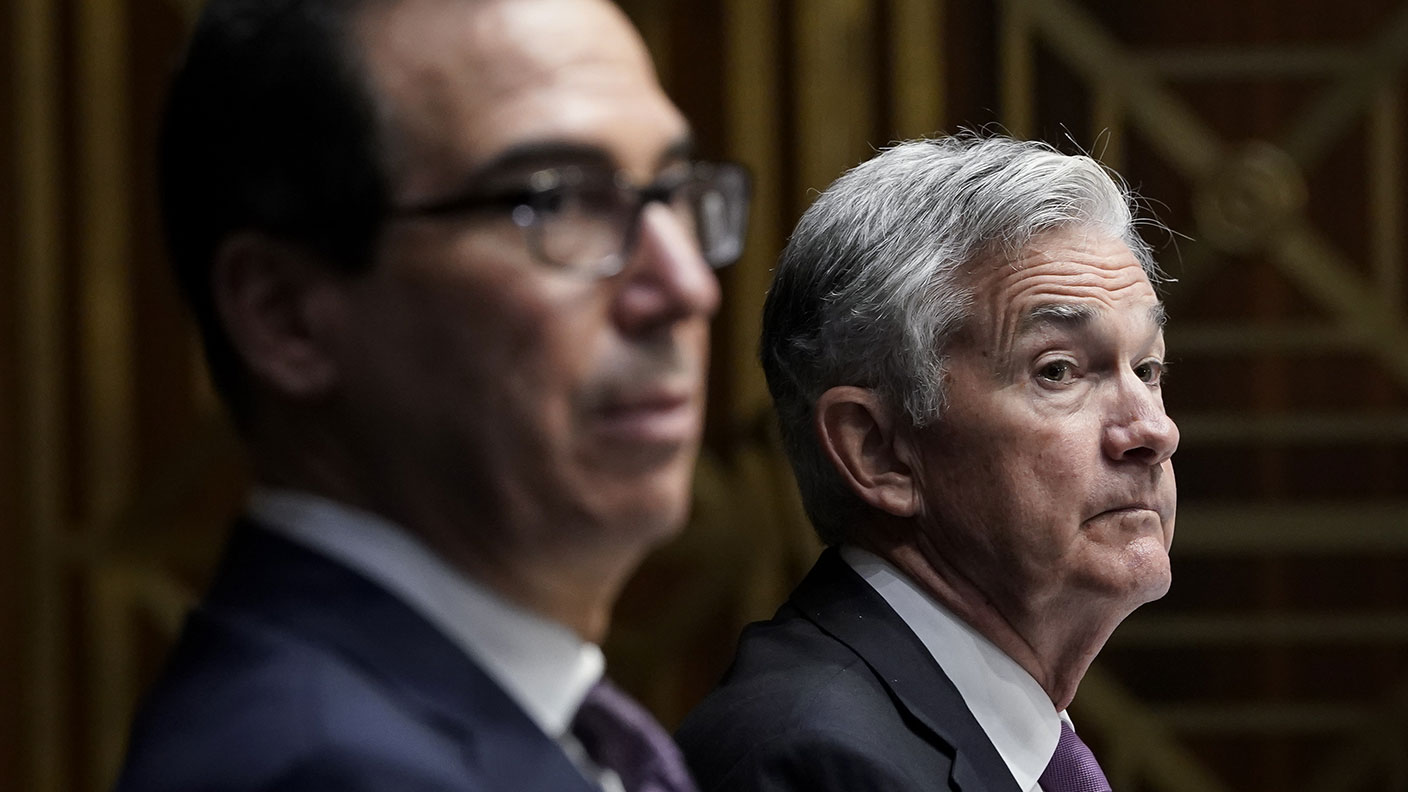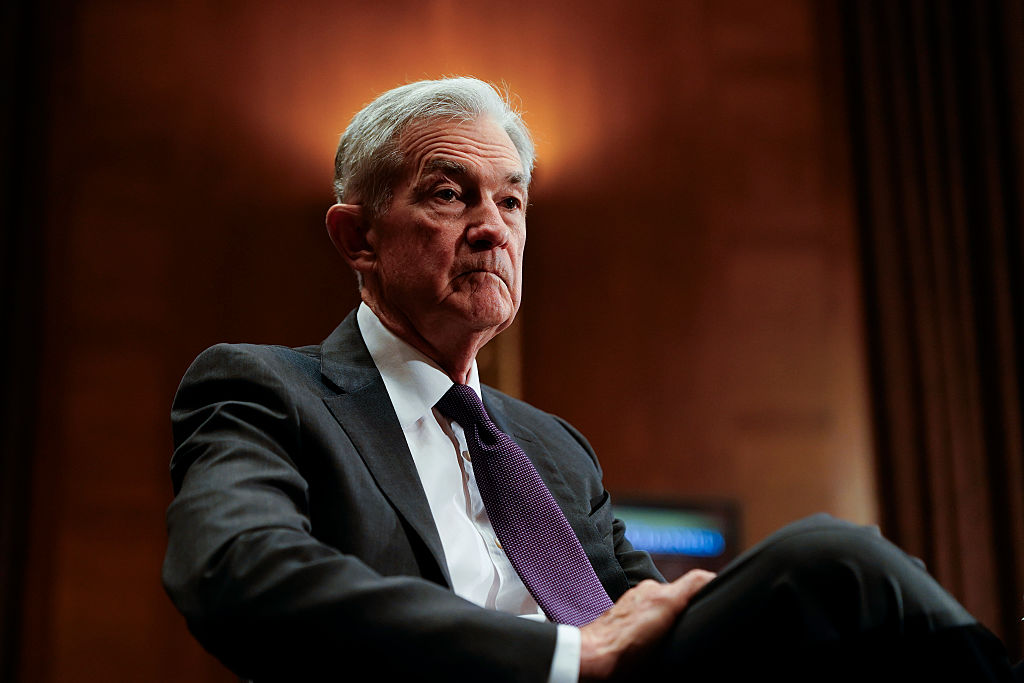Could the spat between the Fed and Trump’s Treasury derail markets?
America’s central bank seems to have fallen out with the US Treasury department. John Stepek explains what’s going on, and how it could affect the markets.


Get the latest financial news, insights and expert analysis from our award-winning MoneyWeek team, to help you understand what really matters when it comes to your finances.
You are now subscribed
Your newsletter sign-up was successful
Want to add more newsletters?

Twice daily
MoneyWeek
Get the latest financial news, insights and expert analysis from our award-winning MoneyWeek team, to help you understand what really matters when it comes to your finances.

Four times a week
Look After My Bills
Sign up to our free money-saving newsletter, filled with the latest news and expert advice to help you find the best tips and deals for managing your bills. Start saving today!
A spat has broken out between the Federal Reserve – America’s central bank – and the US Treasury department. Steve Mnuchin, the US Treasury Secretary (equivalent of the chancellor over here), has told the Fed that he won’t be renewing some of their emergency lending facilities after they expire at the end of next month.
The US central bank, meanwhile, retorted it "would prefer that the full suite of emergency facilities established during the coronavirus pandemic continue to serve their important role as a backstop for our still-strained and vulnerable economy."
Is this a fit of pique by a tantrum-throwing outgoing administration, or is there a bit more to it than that?
MoneyWeek
Subscribe to MoneyWeek today and get your first six magazine issues absolutely FREE

Sign up to Money Morning
Don't miss the latest investment and personal finances news, market analysis, plus money-saving tips with our free twice-daily newsletter
Don't miss the latest investment and personal finances news, market analysis, plus money-saving tips with our free twice-daily newsletter
Why the US Treasury is falling out with the Federal Reserve
You don’t often see public spats between the US Treasury and the Federal Reserve. In fact, you don’t generally see many arguments between central banks and governments. They prefer to play along nicely together.
But of course, the current US government is on its way out (presumably). A certain amount of chaos was always possible, and the idea that the Trump administration might make it harder for the Fed to support the economy while Joe Biden is getting ready for his turn in the hot seat has certainly rattled markets – though not massively.
So what’s happened? Mnuchin wrote to Fed boss Jerome Powell saying that, while four of the central bank’s emergency lending schemes would be extended for 90 days, he wanted the other five to end on 31 December, as scheduled. And he wants the unused funds back too – a mere $455bn. The Fed immediately said that it would rather keep hold of the money.
Markets were a little rattled after the news: US government bonds rose a bit (ie, yields fell), stocks fell from their highs, and the dollar popped a bit higher. Nothing dramatic, but a wee shiver nonetheless.
What’s the rationale? At first it might seem like an outgoing government is just sticking the spokes in the wheels of the incoming one, but it looks like there’s more to it than that. The five schemes that are being shut down on schedule (despite rising Covid-19 cases in the States) are two of those set up to buy corporate debt; the “Main Street Lending Program” for lending to medium-sized businesses; a scheme for lending to local governments; and one to prop up asset-backed securities (such as mortgage-backed bonds).
The four that are being extended are the ones that prop up markets for lending short-term money – such as the commercial paper market (where companies can borrow for very short periods for working capital and the like).
Why scrap the other funds? The reality is that, as the FT points out, “only a small fraction of the available lending capacity was used.” Why? Mainly because the Fed’s other schemes were so effective. “Some companies and local governments ended up securing better funding terms through regular capital markets”, notes the FT, while some businesses found the terms of the Fed facility too strict.
Taking from the central bank to give to the politicians
You might argue that a "belt and braces” approach is more important – why the urgency to end the schemes? But the problem right now is that what the US really needs – if anything – is extra money from the government to compensate people and businesses for lockdowns. That’s difficult just now because not only is the US between governments, it’s also still going to be divided when Biden takes over. So it’s always going to be hard to agree on further spending.
What’s interesting here is that, by taking this money back from the Fed, it frees the cash to be spent elsewhere by Congress. Long story short, the money was already in the budget, so it’s not “extra” cash that they have to pretend to find somewhere. It can be spent with impunity and a lot less political jockeying. In other words, by taking this money from the Fed, Mnuchin both puts pressure on Congress to take action, and hands them a big chunk of money to do it with.
It’s a charitable interpretation, but it’s also the one that makes most sense, and it explains why markets haven’t exactly cratered. As Mnuchin put it in an interview with Bloomberg, companies that are really struggling with the pandemic need grants, not debt: “The economy has responded very strongly, but there are still areas of the economy that need more support. That’s why I’m encouraging Congress to reallocate this money.”
Bloomberg adds, “presumably it will be significantly easier to sell Congress on appropriating these funds rather than working towards a bipartisan fiscal aid package, which has remained elusive for months and which President Donald Trump might not support anyway.”
So what’s the upshot? Don’t get me wrong. If the Fed’s ability to prop up markets was inhibited by the outgoing Trump administration, then Biden would be coming in against the backdrop of a massive market crash. That wouldn’t achieve much – it’s unlikely to be blamed on Biden after all – but maybe you're jaded enough to believe that Trump might just enjoy a scorched earth outcome.
However, I don’t think that’s what’s happening here. And it’s pretty clear that markets don’t either. We’ll see what happens but I think if anything, it just confirms that the reflation trade remains the outcome to bet on right now.
We’ve more on all that – and I also write about when it might be time to start being more circumspect – in the latest issue of MoneyWeek magazine, out now. Get your first six issues free here.
Get the latest financial news, insights and expert analysis from our award-winning MoneyWeek team, to help you understand what really matters when it comes to your finances.

-
 Should you buy an active ETF?
Should you buy an active ETF?ETFs are often mischaracterised as passive products, but they can be a convenient way to add active management to your portfolio
-
 Power up your pension before 5 April – easy ways to save before the tax year end
Power up your pension before 5 April – easy ways to save before the tax year endWith the end of the tax year looming, pension savers currently have a window to review and maximise what’s going into their retirement funds – we look at how
-
 How a dovish Federal Reserve could affect you
How a dovish Federal Reserve could affect youTrump’s pick for the US Federal Reserve is not so much of a yes-man as his rival, but interest rates will still come down quickly, says Cris Sholto Heaton
-
 New Federal Reserve chair Kevin Warsh has his work cut out
New Federal Reserve chair Kevin Warsh has his work cut outOpinion Kevin Warsh must make it clear that he, not Trump, is in charge at the Fed. If he doesn't, the US dollar and Treasury bills sell-off will start all over again
-
 'Investors should brace for Trump’s great inflation'
'Investors should brace for Trump’s great inflation'Opinion Donald Trump's actions against Federal Reserve chair Jerome Powell will likely stoke rising prices. Investors should prepare for the worst, says Matthew Lynn
-
 'Governments are launching an assault on the independence of central banks'
'Governments are launching an assault on the independence of central banks'Opinion Say goodbye to the era of central bank orthodoxy and hello to the new era of central bank dependency, says Jeremy McKeown
-
 Will Donald Trump sack Jerome Powell, the Federal Reserve chief?
Will Donald Trump sack Jerome Powell, the Federal Reserve chief?It seems clear that Trump would like to sack Jerome Powell if he could only find a constitutional cause. Why, and what would it mean for financial markets?
-
 Can Donald Trump fire Jay Powell – and what do his threats mean for investors?
Can Donald Trump fire Jay Powell – and what do his threats mean for investors?Donald Trump has been vocal in his criticism of Jerome "Jay" Powell, chairman of the Federal Reserve. What do his threats to fire him mean for markets and investors?
-
 Do we need central banks, or is it time to privatise money?
Do we need central banks, or is it time to privatise money?Analysis Free banking is one alternative to central banks, but would switching to a radical new system be worth the risk?
-
 Will turmoil in the Middle East trigger inflation?
Will turmoil in the Middle East trigger inflation?The risk of an escalating Middle East crisis continues to rise. Markets appear to be dismissing the prospect. Here's how investors can protect themselves.